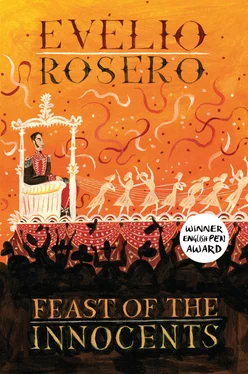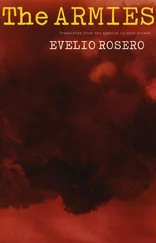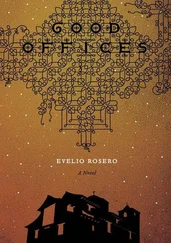No doubt his arrival — the appearance of the first diner, the only one — prompted them to start playing: they began with “La Guaneña.” Behind the blind men a chorus of hundred-year-old women, nine or ten of them, trilled weakly, and it seemed more like a death rattle than “La Guaneña.” “This is how they bid the year farewell,” he said to himself, “and how they’ll greet the new one,” and on one side of the platform he spotted an old couple dancing; it was a listless dance, little clouds of dust were scuffed up by their shoes. It disheartened him to hear “La Guaneña”—war anthem from the days of Agualongo — transformed into a requiem. He drank more aguardiente , and that did nothing to lift his spirits either. He sensed something like bad news in the fog: a presentiment. Luckily the world is a long way off, he thought, I’ll go to bed. He wanted to get up, but his legs felt like someone else’s: he found that during the time that “La Guaneña” lasted he had drunk three half-litres of aniseed aguardiente , plus the first one, which meant that, without knowing it, he had consumed two whole bottles of aguardiente to the lonely strains of that “Guaneña” for the blind. “Right then,” he said to himself, “either I stand up, or I’m dead.”
And he stood up.
He paid the woman. One of the old dears in the choir called out to him, in her faraway, tremulous voice:
“Happy New Year, Doctor Justo Pastor, may God be with you, today as yesterday, tomorrow as today.”
Was she an old patient, or a patient from the other side? The doctor waved goodbye: he could not even manage to reply — it was as if he had forgotten how to talk.
Night was falling. At the Land Rover’s slow passing the city centre began to light up; he wound down the window: the smell of dust and fried food oppressed him; furtive shadows crossed at corners; the first drunks came out onto the street, music swelled, isn’t that Mandarina’s house? The first “visit” of his adolescence had happened there: he had trembled from head to foot; black Mandarina was not only the madam of the establishment, she also initiated the babes, she initiated him, she must be an old lady by now, he thought, why did they call her Mandarina? He remembered her large sex, round and smooth like a split orange, and shivered. Now, in the wide doorway of the big old townhouse, illuminated by a red glow, two girls wearing miniscule skirts, backs hunched over, were lighting cigarettes; they stood scrutinizing him, to see what would happen; one of them came over: lascivious, she offered ancient, unfamiliar words in his ear, and the other, with thick dark hair falling to the back of her knees, carried on staring at him with the constancy of a happy moment, as if she had known him for centuries. “Happy New Year,” the doctor said through the window, and neither girl could understand him, so spellbound did his voice come across. “Not so very long ago,” he carried on, as if telling a joke, “December in Pasto was the month of the dead, but you’ve got to sing and dance, carnival is on its way, nobody cries here, or do they?”
They did not understand him. He was babbling. The girls turned their backs.
When he got home he saw a Vespa parked on the other side of the road and, sitting on the little wall, a boy reading by the scant light of the street lamp, frowning, looking worn out; he was wearing a beret. The poet Rodolfo Puelles did not seem to notice the doctor’s arrival, the noise of the jeep parking, so immersed did he appear to be in his reading. The doctor entered his house hoping to find Sinfín, and did not; he would have liked to ask her whether Maestro Arbelaéz came to look for him the day before, or that very morning.
And only then did it occur to him — Primavera, he thought, Primavera went to open the door to the maestro, she dealt with him and dismissed him, without telling me, Primavera, Primavera, who would not one day wish to become your murderer? This certainty upset him like a betrayal: Primavera had told Cangrejito he was not at home; the sculptor had to go elsewhere with his truck. And it was more than likely, too, that Primavera was not with their daughters: no doubt she had left them at her sister’s house and gone off to meet General Aipe. That possibility revolted him; “Primavera,” he said, and, for a moment, involuntarily, painfully, he imagined her amorously entwined with General Aipe, or with any other body on earth, and his drunkenness aggravated his suspicions: he imagined her spreadeagled on a squeaky hotel bed, suffocated, and an intimate thrill ran through him, in spite of himself. He was alone in his house, a house even lonelier than he was.
“Damn you, world,” he said.
And he repeated this to himself while back in his jeep driving around streets that were getting busier all the time with the New Year: eyes like invitations, shouts, entreaties, explosive music that shattered windows.
He was going to the widow’s house, as if to the castle of an irreproachable maiden.
But he was more excited by Primavera Pinzón than by Chila Chávez. He could not even remember the widow’s face. Was she beautiful? Less beautiful than Primavera? Much more so? She was not an older woman, but not a girl either; her voice redeemed her, it revealed her utterly.
It was a struggle for him to park the jeep without crashing it. Walking to the front door he felt like a thief about to commit a robbery: a dead man stood behind this woman, he thought, and would be no less present for being dead; not a month had passed since his disappearance, who knows what other shapes he would take, is he that willow tree guarding the door? The willow calls me, keeps calling me, or is it the wind moving the branches? He chivvied himself along.
He raised his hand to the doorbell and did not ring it.
There was no light in the windows. He was sure the widow was not going to be expecting him. And what if he found her waiting for him? After so many tribulations, the widow was a shoulder to cry on, he thought, but to cry with too.
The living room curtains opened and Chila Chávez’s face appeared behind it, pale above her black dress, astonished. When she discovered it was him, she seemed more astonished still, but happily so, letting out a great silent laugh. Straight away, she opened the door. She appeared barefoot, her curly hair swept back:
“Come in, my dear doctor,” she said, “but what an old-year face you’ve got on you, I’m going to make it new.”
She was utterly drunk.
Her voice was slurred, as if in rapture — fine Pasto girl of my heart, he thought. She said she had slept and just woken up.
“Come in, come in, my dear doctor,” she said. She indicated a peaceful room where a black radiogram took pride of place and an Agustín Lara record was playing. A local girl, drunk, he said to himself, a disaster waiting to happen? She’ll fall asleep. No, he thought, in spite of her widowhood, or because of it, he was the cause of her small happiness: it’s me that’s exalting her. But the next moment he found out it was not so, in that very instant it is not me embracing her but her immortal deceased, he thought, or managed to think, buried in the widow’s perfumed hair, and he heard her whispers, almost without understanding her, but he did understand her, aghast, little doctor of mine, I was waiting for you here, my mouth and my legs wide open, little husband of my soul, why did you go and die on me?
Opposite the widow’s house, to one side of the lamp post, Puelles the poet settled down to read, back against the wall: “I’ll keep an eye on you from here, Doctor, but only until eleven, I’ve got my New Year’s Eve too.”
An only child, he lived with his parents and his grandfather, Capusigra the cobbler. His parents hated him — or so he believed. Things were different with his grandfather: they played dominoes, read aloud from the newspaper, or from his grandfather’s favourite book— Don Quixote —whatever page it fell open at. His grandfather was an ancient old man, but lucid, and was expecting him — he’ll definitely want to have a drink with me and see out the year, he thought. He looked at his watch: nine o’clock. He had left the Vespa in the shadow of an elm tree so the doctor would not see it. What am I doing here? What is my body doing in this street? He thought it shameful and even more idiotic to find himself there, spying on the gynaecologist, carrying out the orders of a lunatic. Wouldn’t it be preferable to jump this ship as soon as possible, to forget the tragedy of the policeman and start life afresh? In a city where no-one knew him. Singapore? Change his name, change his face, be reborn? One thing was certain — he swore — he would never give up his poetry.
Читать дальше












